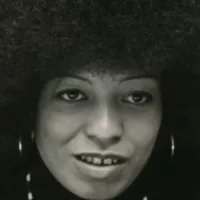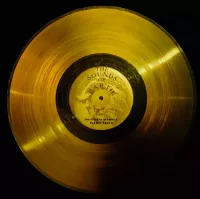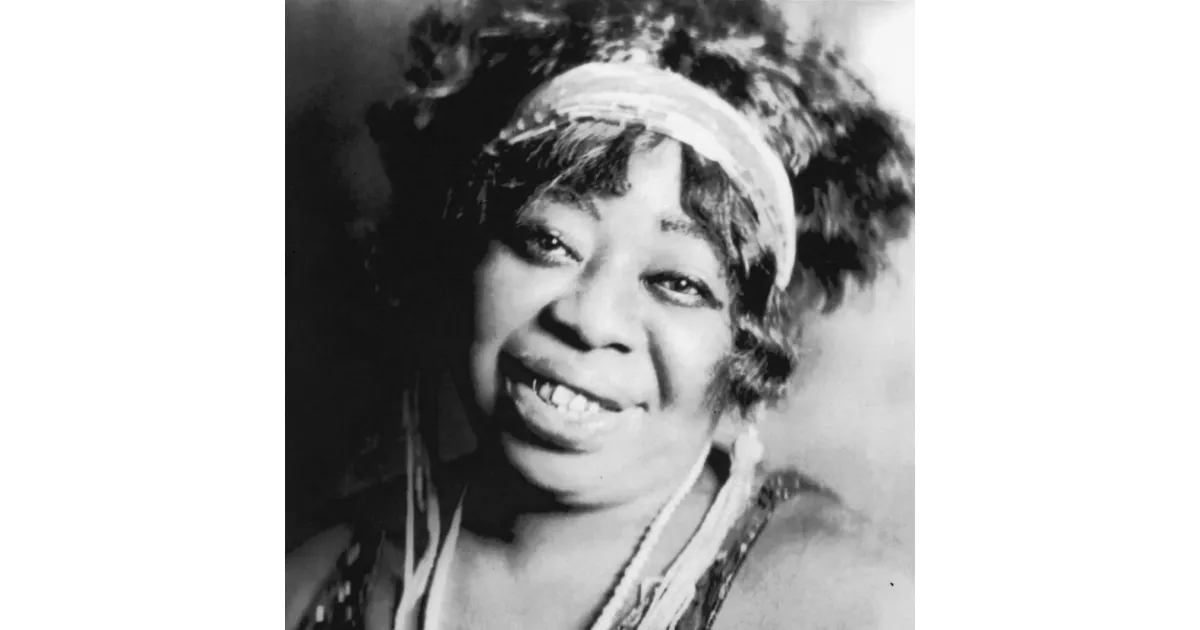Gertrude "Ma" Rainey, an American blues singer known as the "Mother of the Blues," played a pivotal role in shaping early blues music. Her powerful vocals, lively stage presence, and soulful "moaning" style bridged the gap between vaudeville and authentic Southern blues. Rainey's influence on a generation of blues singers is evident in her iconic recordings like "Bo-Weevil Blues" and "Moonshine Blues," which showcase her unique musical qualities.
1900: 1900 Census
The 1900 census indicated that Gertrude Pridgett was born in September 1882 in Alabama.
1902: Introduction to Blues Music
Ma Rainey claimed her first exposure to blues music occurred around 1902.
February 1904: Adoption of the Stage Name "Ma Rainey"
Upon her marriage to William "Pa" Rainey in February 1904, Gertrude adopted the stage name "Ma Rainey."
1904: Marriage to Will "Pa" Rainey
Gertrude Pridgett married William "Pa" Rainey in 1904 and adopted the stage name "Ma" Rainey.
1906: Joining the Rabbit's Foot Company
Ma Rainey and her husband joined Pat Chappelle's Rabbit's Foot Company in 1906.
April 25, 1910: 1910 Census
The 1910 census, taken on April 25, 1910, recorded Gertrude Pridgett's birthdate as April 26, 1886.
1910: Recognition as a "Coon Shouter"
In 1910, Ma Rainey was described as a "coon shouter."
1912: Continuing with the Rabbit's Foot Company
Ma Rainey continued performing with the Rabbit's Foot Company under new ownership in 1912.
1914: Formation of "Rainey and Rainey, Assassinators of the Blues"
Ma Rainey and her husband began performing as "Rainey and Rainey, Assassinators of the Blues" in 1914.
1916: Separation from Will "Pa" Rainey
Ma Rainey and Will "Pa" Rainey separated in 1916.
1920: Mamie Smith Becomes First Black Woman Recorded
Mamie Smith became the first black woman to be recorded in 1920, marking a significant milestone in the music industry.
1923: Signing with Paramount Records
Ma Rainey was discovered by Paramount Records producer J. Mayo Williams and signed a recording contract in 1923.
1923: First Recording
Ma Rainey's first recording took place in 1923, marking the beginning of her recording career.
April 1924: Tour with the Theater Owners Booking Association (TOBA)
Ma Rainey embarked on a tour with the Theater Owners Booking Association (TOBA) in April 1924.
1924: Recording of "See See Rider Blues"
Ma Rainey recorded her iconic song "See See Rider Blues" in 1924, which later received significant recognition and accolades.
1925: Arrest for Alleged Involvement in an Orgy
In 1925, Ma Rainey was arrested for her alleged involvement in an orgy at her home.
1925: Release of "See See Rider Blues"
Ma Rainey released "See See Rider Blues" in 1925.
1926: Thomas Dorsey Leaves the Band
Thomas Dorsey left Ma Rainey's band in 1926 due to health issues.
1927: Setting of "Ma Rainey's Black Bottom"
August Wilson's play "Ma Rainey's Black Bottom" is set in 1927, during a fictionalized recording session of the song of the same name.
1927: Release of "Ma Rainey's Black Bottom" and "Soon This Morning"
Ma Rainey released two notable songs in 1927: "Ma Rainey's Black Bottom" and "Soon This Morning".
1928: Release of "Prove It on Me"
Ma Rainey released the song "Prove It on Me" in 1928, which contained references to lesbianism or bisexuality.
1928: Conclusion of TOBA Tour
Ma Rainey's tour with the Theater Owners Booking Association (TOBA) concluded in 1928.
1928: Paramount Records Terminates Contract with Ma Rainey
Paramount Records terminated their contract with Ma Rainey in 1928, finding her style of blues outdated.
1932: Sterling A. Brown Publishes "Ma Rainey" Poem
Sterling A. Brown published his poem "Ma Rainey" in 1932, capturing the excitement and impact of her performances.
1935: Ma Rainey Moves Back to Columbus
In 1935, Ma Rainey moved back to Columbus, Georgia, and resided in the house she had built for her mother until her death in 1939.
1935: Retirement and Transition to Theater Management
Ma Rainey largely retired from performing in 1935 and transitioned to managing theaters in Columbus, Georgia.
1935: Return to Columbus and Theater Ownership
Ma Rainey returned to Columbus, Georgia in 1935 and became the owner of three theaters.
December 22, 1939: Death of Ma Rainey
On December 22, 1939, Ma Rainey died of a heart attack in Columbus, Georgia.
1939: Death in Columbus
Ma Rainey died in Columbus, Georgia in 1939.
1939: Ma Rainey's Passing
Ma Rainey passed away in 1939 at her home in Columbus, Georgia.
1981: Publication of "Mother of the Blues: A Study of Ma Rainey"
Sandra Lieb published the first full-length biography of Ma Rainey, "Mother of the Blues: A Study of Ma Rainey," in 1981.
1982: Premiere of "Ma Rainey's Black Bottom" Play
August Wilson's play "Ma Rainey's Black Bottom," a fictionalized account of a recording session, premiered in 1982.
1983: Induction into the Blues Foundation's Hall of Fame
Ma Rainey was posthumously inducted into the Blues Foundation's Hall of Fame in 1983, recognizing her significant contributions to the blues genre.
1990: Induction into the Rock and Roll Hall of Fame
In 1990, Ma Rainey was posthumously inducted into the Rock and Roll Hall of Fame, solidifying her influence on rock and roll music.
1994: U.S. Postage Stamp Issuance
The U.S. Post Office issued a 29-cent commemorative postage stamp in 1994 to honor Ma Rainey's contributions to American music.
1999: Publication of "Blues Legacies and Black Feminism"
In 1999, Angela Davis published her book "Blues Legacies and Black Feminism," where she explored the themes of Black female empowerment and self-expression in Ma Rainey's music.
2004: Grammy Hall of Fame Induction and National Recording Registry
Ma Rainey's 1924 recording of "See See Rider Blues" was inducted into the Grammy Hall of Fame in 2004, and the Library of Congress added it to the National Recording Registry that same year.
2007: Opening of the Ma Rainey Museum
A museum dedicated to Ma Rainey's life and legacy opened in Columbus, Georgia, in 2007, located in the house she built for her mother and lived in from 1935 to 1939.
2015: Mo'Nique portrays Ma Rainey in "Bessie"
Mo'Nique portrayed Ma Rainey in the 2015 television film "Bessie," a biographical film about Bessie Smith, for which she was nominated for a Primetime Emmy Award.
April 2016: First Annual Ma Rainey International Blues Festival
The first annual Ma Rainey International Blues Festival took place in April 2016 in Columbus, Georgia, near Ma Rainey's former home.
2017: Opening of the Rainey-McCullers School of the Arts
The Rainey-McCullers School of the Arts, named in honor of Ma Rainey and author Carson McCullers, opened in Columbus, Georgia, in 2017.
2020: Film Adaptation of "Ma Rainey's Black Bottom"
A film adaptation of "Ma Rainey's Black Bottom" was released in 2020, with Viola Davis portraying Ma Rainey and receiving an Academy Award nomination for her performance.
2020: Posthumous Portrayal in "Ma Rainey's Black Bottom"
Ma Rainey was portrayed in the Academy Award-winning film "Ma Rainey's Black Bottom" in 2020.
2023: Grammy Lifetime Achievement Award
Ma Rainey was honored with the Grammy Lifetime Achievement Award in 2023.
Mentioned in this timeline

Angela Davis is an American political activist philosopher academic and...

Viola Davis is a highly acclaimed American actress and film...

The Rock and Roll Hall of Fame located in Cleveland...

Music is a cultural universal involving the arrangement of sound...
Alabama is a state in the Southeastern United States bordered...

Books are a means of storing information as text or...
Trending
12 minutes ago Winter Weather Advisory: Blizzard Impacts Aberdeen, Snow in Black Hills, Chilly Weekend

1 hour ago Rory McIlroy Confident for Genesis Invitational, Eyes Masters Return to Augusta.

2 hours ago Jennifer Garner jokingly expresses desire for a 'physical fight' with Judy Greer.

2 hours ago Chicago Bears Consider Hammond Site as Indiana Prepares Stadium Bill Vote.
2 hours ago Afghanistan Faces Canada in T20 World Cup; Trott Departs, Rashid Khan Honors Him.
4 hours ago Prince William discusses mental health, male suicide, and talking to his children.
Popular

Jesse Jackson is an American civil rights activist politician and...
Randall Adam Fine is an American politician a Republican who...

Pam Bondi is an American attorney lobbyist and politician currently...

Barack Obama the th U S President - was the...

Ken Paxton is an American politician and lawyer serving as...

Martin Luther King Jr was a pivotal leader in the...
